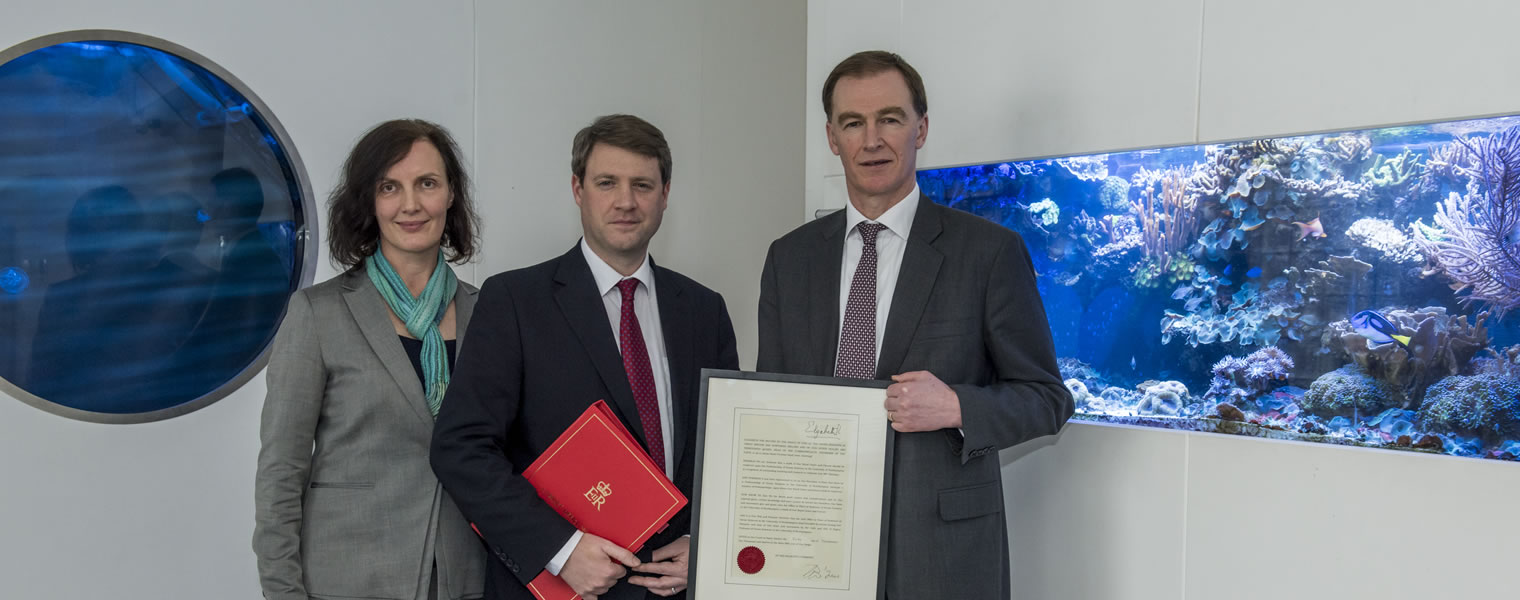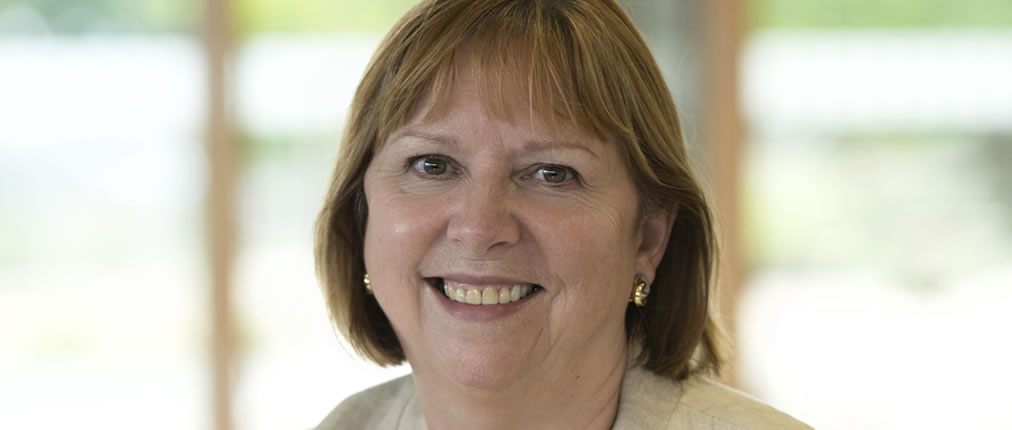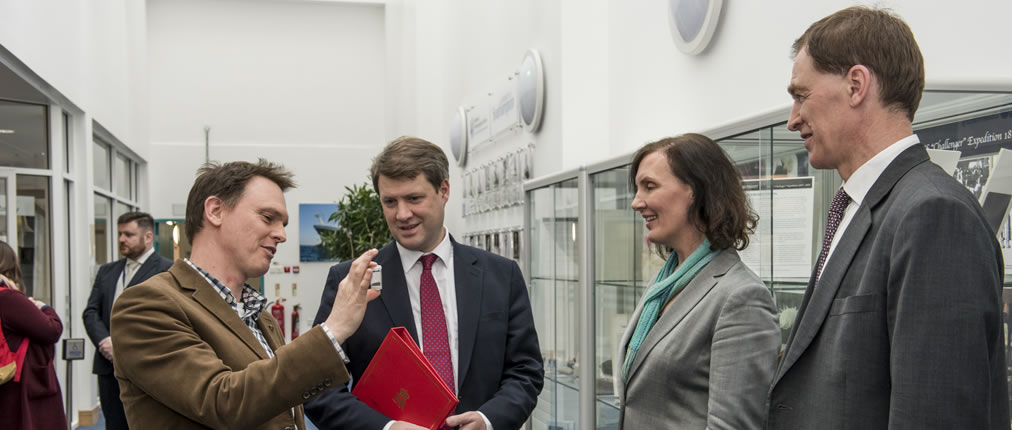Hartley News Online Your alumni and supporter magazine
Left to right: Professor Rachel Mills, Dean of Natural and Environmental Sciences; Chris Skidmore MP, UK Minister for the Constitution and Mark Spearing, Vice-President (Research and Enterprise) in June 2016 when the University was presented with a Royal Warrant signed by Her Majesty the Queen, officially conferring Her Majesty’s recognition with the title of the Regius Professor of Ocean Sciences.
Regius Professorships are rare and prestigious awards. The first was presented in 1497 to Aberdeen University in the field of medicine.
In recognition of the exceptionally high quality of our research, the University of Southampton was awarded its first Regius Professorship of Computer Science by HM The Queen in 2013 to mark her Diamond Jubilee. A second was awarded to Ocean Sciences in 2016, as part of The Queen’s 90th birthday celebrations.
Southampton Connects Staff talks to Dame Wendy Hall, appointed Regius Professor of Computer Science in February this year, and to Professor Paul Wilson who now has the task of recruiting a Regius Professor of Ocean Sciences.
Dame Wendy Hall, you were appointed Regius Professor of Computer Science earlier this year. What has your experience been of this appointment so far?
To be honest, my day-to-day life hasn’t changed at all. The job of a Regius Professor is to be a leader in the field (in our case, computer science) and an ambassador for the University and the department, both nationally and internationally.
What does the role mean to you personally?
I have been at Southampton since 1971, when I arrived as a student to read mathematics. I did my PhD at Southampton and left in 1977 to teach mathematics at the higher education level. But when personal computers came out in the 1980’s I started to become more and more interested in how people would use them in the future and gradually moved into computing.
I came back to Southampton in 1984 as a lecturer in computing, and the rest, as they say, is history. When I came back to teach computing it was a tiny department with just one professor (David Barron) and a handful of staff and students. We really expanded in the 1990’s.
I got my chair in 1994, and since then we have built Computer Science up to the world-leading status it has today, both in terms of research and education. It has been a huge privilege to be part of this and it was wonderful that this achievement was recognised by the award of the Regius Chair by The Queen. I am very honoured to be the Regius Professor.
As someone who has worked hard to improve the reputation of Computer Science, how will the Regius Professorship continue this legacy?
It will be a lasting legacy for the University and for Computer Science at Southampton long after I’m gone. It is a very prestigious award to have received, both for me personally and for the University.
What difference do you think having this role makes to the University as a whole, and Computer Science in particular?
It recognises our achievements in Computer Science and hopefully will help us attract more wonderful students to Southampton to continue with the legacy.
What does a Regius Professor do, and what are some of the more quirky sides to the job?
The title brings extra international visibility and scientific gravitas so it’s an opportunity, for example, to be heard beyond academic circles and make one’s voice count in the policy arena. Quirks of the job are difficult to predict, but I suppose that you might anticipate that they’d be in the line-up at the University’s next royal visit.
Left to right: Professor Paul Wilson, Head of Palaeoceanography and Palaeoclimate Research Group, talking to Chris Skidmore MP, UK Minister for the Constitution; Professor Rachel Mills, Dean of Natural and Environmental Sciences and Mark Spearing, Vice-President (Research and Enterprise).
The first award was made in 1497, isn’t it rather an antiquated accolade?
Ancient origins signify prestige, but the job is modern. We’re searching for someone with cutting-edge skill sets. Beyond their specialist scientific credentials, they will be a leader who will help to make a difference across campuses and throughout the world.
With regards to Ocean Sciences, what are the areas of research that have resulted in this award?
The award is in recognition of the University’s distinctive profile in the marine and maritime sector and our world-leading expertise and research facilities in: oceanography; Earth science; climate change; seafloor energy and resources; geohazards; ship science and maritime engineering; and maritime law, archaeology and history.
What specifically are we being recognised for?
The University’s outstanding research strength in this area is evidenced by the Research Excellence Framework 2014 (REF2014) in which our programmes in both ocean and Earth science and general engineering gained leading rankings.
Our internationally recognised research excellence is built on a 50-year legacy from visionary founders of oceanography as a new discipline.
Since then we have pioneered the demonstration of the role of ocean currents in the global climate system, the development of novel Earth System models, and transformed naval architecture and safety at sea through advances in structural dynamics, hydrodynamics, statistics and physical oceanography.
What is the link between the Professorships and British jobs, exports and benefiting society as a whole?
Universities and their home cities are among the leaders of the knowledge-based economy. The key resource is talented people. It’s not easy to quantify the true value of a singular investment such as this one, but it’s estimated that the direct contribution to the UK economy from the maritime sector is over £10bn annually. That’s a sector in which Southampton is a big player and that figure is similar to other high value UK industries such as pharmaceuticals or aerospace.
What difference will it make to the University as a whole and to Ocean and Earth Sciences in particular?
There’s a fantastic array of research, enterprise, education and training in the environment sector going on in just about every corner of the University. The Regius Professor of Ocean Sciences will be based in Ocean and Earth Sciences at the National Oceanography Centre Southampton (NOCS) on the University’s waterfront campus, but I’d like to think that they would be ambitious to help lead the effort to join these activities up and capitalise on Southampton’s critical mass of expertise. They should also be someone of the calibre to play a leading role in major multinational scientific collaborations such as, say, the Intergovernmental Panel on Climate Change, or the International Ocean Discovery Program.
What sort of candidate are you looking for?
The search is extremely broad. We are looking at top talent in all areas of the ocean sciences defined in the widest possible terms. The successful candidate will have an outstanding track record of publishing in leading international journals; evidence of attracting significant research funding; research leadership leading to impact of this work in societal, industrial and/or policy matters; and the ability and readiness to take advantage of the multidisciplinary research opportunities offered by the University.
The closing date for applications is 1 December 2017. Early applications are encouraged as applications are reviewed on a regular basis so the call may close earlier than this stated date if suitable candidates are identified. First review date is 1 April 2017.
For further information, contact Paul Wilson.


